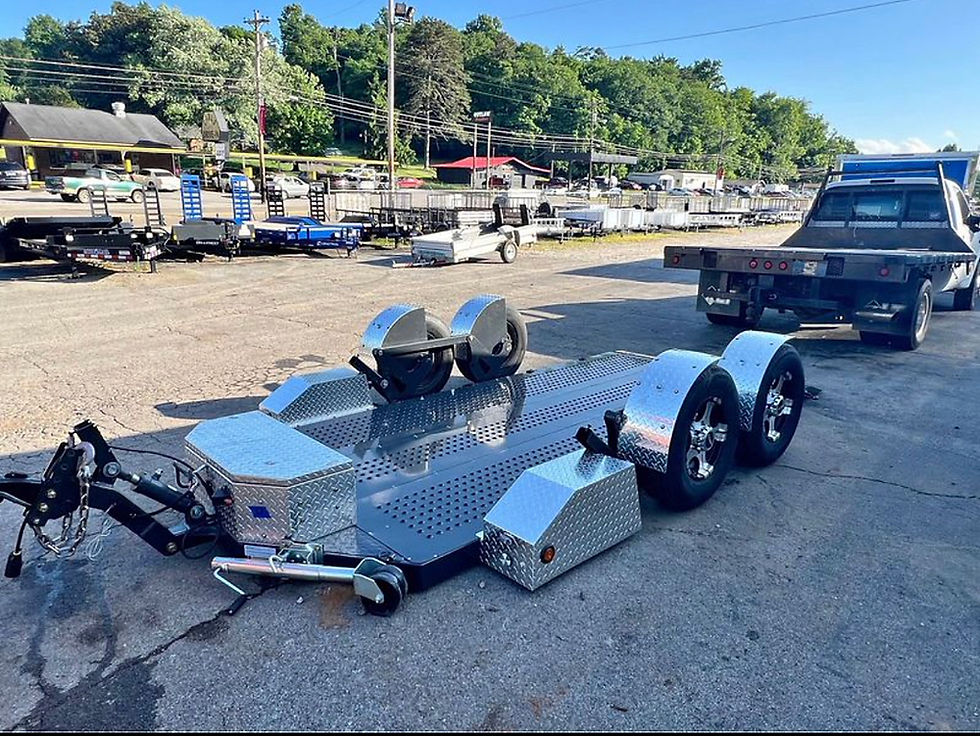Complete Guide of Car Haulers: Basic & Special Types
- US Headquarter-Rafaela

- Jan 30, 2025
- 3 min read
Car haulers are essential for transporting vehicles safely and efficiently, whether you’re moving a single vehicle or transporting a fleet. Understanding the different types of car haulers helps you choose the right one for your needs. This guide covers both basic car haulers and special car haulers, highlighting their unique features and ideal applications.
Basic Types of Car Haulers
1. Open Top Car Haulers
Description: The most common and affordable type, open car haulers have a flatbed with no sides or roof, the deck typically made by wood or aluminum and the frame is in steel or aluminum.
Best For: Transporting standard passenger cars, SUVs, and small trucks.
Pros: Lightweight and easy to tow. Affordable and widely available.
Cons: Vehicles are exposed to weather, road debris, and other elements.
2. Enclosed Car Haulers
Description: These haulers are fully enclosed with walls or roof or even special transparent film, providing complete protection for the vehicles inside the box.
Best For: Transporting luxury, vintage, or high-value cars.
Pros: Superior protection from weather and debris.
Enhanced security with lockable doors.
Cons: Heavier and more expensive than open haulers.
3. Tilt Deck Car Haulers
Description: A flatbed trailer with a tilting mechanism that allows easy loading and unloading process of vehicles.
Best For: Transporting vehicles easier with typical sport car.
Pros: No need for ramps and simplifies loading for low-chassis cars.
Cons: Generally expensive than fixed-deck trailers.
Specialized Types of Car Haulers
1. Hydraulic Car Haulers
Description: Equipped with hydraulic systems for raising and lowering the bed or ramps by fully grounded.
Best For: All kinds of vehicle or machine or specialized vehicles such as super cars, special racing cars or luxury motorcycles.
Pros: Smooth and controlled loading/unloading process. The deck can be down to the ground 100% to match all kinds of vehicle.
Cons: A bit expensive than tilt deck car haulers.

2. Multi-Car Haulers
Description: Designed to transport multiple cars simultaneously, often seen in commercial operations.
Best For: Dealerships and fleet relocations.
Pros: Efficient for moving multiple vehicles at once. Transport up to six or more cars depending on size .
Cons: Requires more powerful towing equipment and skilled operation.
3. Gooseneck Car Haulers
Description: A trailer with a gooseneck hitch that attaches to a truck bed for better weight distribution and stability.
Best For: Heavy and long-distance hauls.
Pros: Greater stability and towing capacity. Handles heavy loads better than standard hitch trailers.
Cons: Requires a compatible truck for towing.
4. Custom Car Haulers
Description: Built to order with specific features tailored to unique needs, such as specialized ramps, extra tie-downs, etc.
Best For: Specialized transport needs or unique vehicle types.
Pros: Fully customizable to match precise requirements.
Cons: Higher cost and longer build times.
Choosing the Right Car Hauler
Selecting the right car hauler depends on the type of vehicle, frequency of use, and level of protection needed. For general transport, an open car hauler offers simplicity and affordability. For higher-value vehicles, an enclosed trailer is worth the investment. Commercial users may benefit from multi-car or hydraulic car haulers for efficiency and versatility. Contact the dealer before you put an order to get more professional advice. At P&F Trailers, we offer a full selection of car haulers tailored to your requirements—contact us today to find the perfect solution for your vehicle transport needs!





Comments